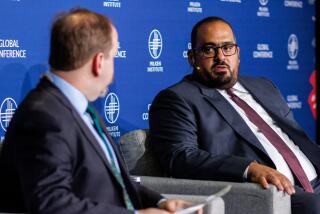Iraq Privatizes State-Run Economy, Attracts Investors
- Share via
BAGHDAD, Iraq — After 8 years of war, Iraq is moving to turn swords into plowshares by privatizing much of the state-run economy and attracting foreign investment for peacetime reconstruction.
“It may seem odd that a highly centralized socialist state should turn to capitalist methods,” said a Foreign Embassy official. “But no doubt President (Saddam) Hussein would argue it was a natural step in party ideology.”
Much has already been done to expand the private sector, diplomats say. The process began last year, when Iraq was still fighting revolutionary Iran.
50 State Enterprises for Sale
More than 50 state enterprises and parcels of government land have been offered for sale to the private sector and 37 of them have been sold, officials said.
“Most of them were state farms or food-processing plants, with some light industry,” said a foreign economist.
Import controls have also been relaxed, and the ceiling on prices of many consumer goods lifted.
“The variety and quality of food appearing in shops has improved enormously,” said a diplomat, “but it does mean that prices have gone up sharply in many cases.”
The aim was to encourage farmers to step up production and give them sufficient incentive to bring their crops to city markets.
Starting next year, factory owners will no longer have to pay hefty labor and social security taxes.
Subsidies on basic commodities--including bread, rice, milk and sugar--have been kept in what diplomats said was a deliberate move to avert any public unrest, such as the violence sparked in Algeria last month by price increases.
State monopolies have also been broken up in some sectors.
In housing, there are now two government-run agencies and one private organization competing for orders.
To improve efficiency, diplomats said, a middle layer of bureaucracy was removed last year when some state supervisory bodies were shut down.
Instead, individual state enterprises now report directly to the ministry concerned.
“The process started when Iraq was still in a shooting war. I don’t know whether President Hussein wanted to follow the example of (Soviet leader Mikhail S.) Gorbachev or (British Prime Minister Margaret) Thatcher,” said one foreign envoy.
Shaking Things Up
“It may be that he simply wanted to shake things up and sharpen the overall war effort,” he added.
Foreign analysts said Iraq has enormous potential. It has the second-largest oil reserves in the world, plentiful water, a sound agricultural base and a substantial population, estimated at about 17 million.
More than 2,000 foreign firms are taking part in Baghdad’s 25th trade fair--a sign of foreign interest in taking a share of that wealth.
Yet turning from war to wealth will not be easy. A cease-fire took hold on the war front last August, but diplomats said a comprehensive peace settlement still seems a long way off.
Still an Investment Risk
“What does a cease-fire mean?” asked one diplomat. “It means you are no longer using live ammunition. It makes Iraq a better risk for investment, but a risk all the same.”
And until the Geneva talks produce a durable settlement, Iraq will have to maintain its armed forces, arguably the strongest in the Arab world.
“My country has more firms participating (in the fair) than ever before,” said one embassy attache. “But they are taking a watch-and-wait attitude.”
One reason is Iraq’s war debt.
Diplomats estimated Iraq’s total foreign debt at $60 billion, about half of it in Arab credit.
“The Arab debt is largely political,” said a foreign observer, “and is likely to be written off.”
The rest is owed to the West, Eastern Europe and Japan.
The economic attache said he thought repayments and interest would cost Iraq about $2 billion a year.
“They still want to borrow more,” he said.
He believes imports of foreign consumer items cost Iraq an annual $4 billion, while maintaining and re-equipping the armed forces in case of renewed conflict could absorb several billions more each year.
“Official data is not available, so it’s largely guesswork. But even with oil revenue, Iraq is not going to have much left over for reconstruction and development in the short term,” he added.
Iraq has said it has reserves of 100 billion barrels of oil. Diplomats say Iraq exports about 2.3 million barrels a day, and at a current price of about $12 a barrel, annual revenue is probably less than $10 billion.
Priority will be given to rebuilding Basra, Iraq’s only port at the northern end of the Persian Gulf, and to a new refinery and petrochemical complex south of Baghdad.
Is there an economic miracle in the offing?
“I don’t think we can talk about miracles in Iraq unless liberal economics are matched by political flexibility at home,” said one Asian diplomat.
“There is a glimmer of change, but Hussein is very cautious.”
More to Read
Sign up for Essential California
The most important California stories and recommendations in your inbox every morning.
You may occasionally receive promotional content from the Los Angeles Times.










